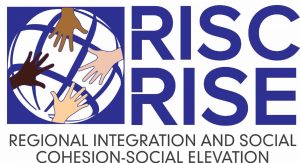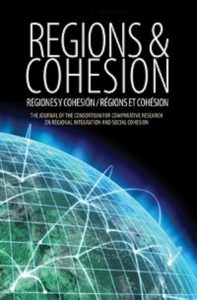RISC-RISE
Home » Faculties of Humanities » Departments » Politics and International Relations »For a French translation of this website page click here; For a Spanish translation, click here.

Follow us on Facebook
Find out more about RISC-RISE! Watch this short video… https://www.facebook.com/RISCconsortium/videos/3096009557148833/
RISC-RISE Call for papers- ENGLISH
RISC- RISE Call for papers- FRENCH
RISC-RISE Call for papers- SPANISH
MISSION
The mission of the Consortium for Comparative Research on Regional Integration and Social Cohesion (RISC) is to promote the comparative examination of the human and environmental impacts of various aspects of regional integration across geographic areas and time periods through the creation of a cross-regional and interdisciplinary network. Moreover, the research conducted through this consortium could eventually support social action projects in local communities through improved understanding of evolving political and economic context.
OBJECTIVES
Create new programs of comparative research through the establishment of interregional networks. Promote intellectual exchange between researchers in different continents through multilingual activities Establish new publication opportunities. Support exchanges of professors and researchers. Facilitate the mobility of Ph.D. candidates. Provide a support structure for applications for external research funding
HISTORY
The RISC Consortium was established in November 2007 when the directors of socially conscious research institutes from Europe, North America and South America met in Luxembourg to participate in a conference on “Social Cohesion in Europe and the Americas.” Since that time, the consortium has expanded its membership into Africa and consolidated its scientific activities through annual international conferences, a book series, a new scientific journal, thematic workshops/symposium and grants for young scholars. The RISC Consortium plans to support policy-relevant research and training in the near future.
GOVERNANCE
Co-Presidents
Dr Harlan Koff
Unité de Recherche IPSE, Université du Luxembourg.
Prof. Suzanne Graham
Department of Politics and International Relations, University of Johannesburg, South Africa.
Executive Director
Prof. Vicky Graham
Department of Politics and International Relations, University of Johannesburg, South Africa.
Consortium Secretary
Ms. Rae Israel
Department of Politics and International Relations, University of Johannesburg, South Africa.
risrael@uj.ac.za; +27 11 559 2896
Scientific Committee
Dr. Emmanuel Brunet-Jailly (University of Victoria, Canada)
Dr. Suzanne Graham (Department of Politics and IR, University of Johannesburg, South Africa)
Dr. Edith Kauffer (CIESAS Sureste, Mexico)
Dr. Carmen Maganda (INECOL, Mexico)
Dr. Harlan Koff (Unité de Recherche, IPSE, Université du Luxembourg)
Dr. Anja Nygren (Department of Political and Economic Studies, University of Helsinki, Finland)
Dr. Juan Carlos Velez Rendon (IEP, Universidad de Antioquia, Colombia)
INSTITUTIONAL MEMBERS
ART-DEV Laboratoire Acteurs, Ressources, Territoires dans le Développement
Université Montpellier 3, France
Center of Sudies on Regional Integration and Southern African Development Community Law (CEDIR)
Universidade Eduardo Mondlane, Mozambique
Centro de Investigación y Docencia Económicas (CIDE) Región Centro
México
Centro de Investigaciones y Estudios Superiores en Antropología Social (CIESAS)
México
Centre for Study of Governance Innovation (GovInn)
University of Pretoria, South Africa
Department of Anthropology
University of California, Santa Barbara, USA
Department of Politics
University of Johannesburg, South Africa
Department of Political and Economic Studies
University of Helsinki, Finland
Escuela de Ciencias y Humanidades
Universidad EAFIT, Colombia
Faculty of Social and Health Sciences
Monash University South Africa, South Africa
Institute for Social Development Studies (ISDS)
Vietnam
Instituto de Ecología (INECOL)
México
Instituto de Estudios Políticos (IEP)
Universidad de Antioquia, Colombia
Instituto de Estudios Regionales (INER)
Universidad de Antioquia, Colombia
Luxembourg Institute of Socio-economic Research (LISER)
Luxembourg
Local Government Institute
University of Victoria, Canada
Mershon Center for International Security Studies
Ohio State University, USA
Núcleo de Estudos da Cidadania, Conflito e Violência Urbana (NECVU)
Universidade Federal do Rio de Janeiro, Brazil
School of Human Evolution & Social Change
Arizona State University, USA
Unité de Recherche IPSE
Université du Luxembourg, Luxembourg
West Africa Institute
Cabo Verde
FIRST RISC FELLOWS
RISC-RISE is pleased to announce its first two Fellows:

Prof Deon Geldenhuys -Distinguished RISC Fellow Sandra Habel – RISC Fellow
WORKING GROUPS
- QUALITY OF DEMOCRACY
This Working Group Explores The Possibilities For Democracy To Loosen The Stranglehold Of Poverty, Insecurity And Weak Rule Of Law That Continue To Buffet Citizens Of Democratic Nations Throughout The World. It Seeks To Support Interdisciplinary Research That Endeavors To Understand The Factors Shaping Citizens’ Ability To Meaningfully Engage With Or Change Institutions, And How The Quality Of Democratic Institutions Changes Over Time.
Coordinator: Prof. Vicky Graham (Department of Politics and International Relations, University of Johannesburg, South Africa.)
- DEVELOPMENT, EQUITY AND POLICY COHERENCE
The objective of this working group is to examine the coherence of public policy systems for the promotion of sustainable development. It examines the emergence of regional policy-making and its relationship to the Sustainable Development Goals. The group adopts a comparative regional perspective that examines development challenges faced by stakeholders in different world regions and the interconnectedness of development processes between these regions. It considers how regional integration can contribute to the achievement of sustainability within these contexts. The group is particularly interested in normative policy coherence for development perspectives through which development strategies aim to reinforce key norms in global affairs such as human rights, gender equality and socio-ecological sustainability, amongst others.
Coordinators: Dr Harlan Koff (Department of Geography and Spatial Planning, University of Luxembourg) and Dr Lauri Siitonen, (Department of Political and Economic Studies, University of Helsinki, Finland)
- MANAGEMENT OF STRATEGIC RESOURCES, ENVIRONMENT AND SOCIETY
This Working Group Explores The Challenges Of Creating A Truly Sustainable And Equitable Society From Interdisciplinarity And Transdisciplinarity Perspectives. It Aims To Establish A Platform Of Trans-Regional-Comparative Research In Order To: Broaden And Integrate The Discussion On Socio-Economic-Political Analysis Concerning The Management Of Strategic Resources, Promote Better Social Knowledge Of Environmental Politics And Socio-Development-Environmental Problems, And Promote Environmental Rights Analysis In A Global Context.
Coordinators: Dr. Carmen Maganda (INECOL, Mexico) and Dr. Edith Kauffer (CIESAS Sureste, Mexico)
- CIVIL SOCIETY, VULNERABLE POPULATIONS, AND STATE POLICIES OF HEALTH AND WELL-BEING
This Working Group Seeks To Conduct Collaborative/Comparative Research On The Role And Incidence Of Civil Society In Regional And State Policies Of Health And Well-Being. This Approach Considers The Social And Political Maturity Of The State, The World Context Of A Supposed Democratization And Liberalization Of Access To Health And Well-Being, As Well As The Recognition Of The Plurality Of Concepts Which Inform These Policies And An Increase In The Expectations And Demands Citizens Manifest Before The State.
Coordinator: Dr. Claudia Puerta Silva (INER, Universidad de Antioquia, Colombia)
- THE SOCIAL CONSTRUCTION OF RISK AND DISASTERS
This Working Group Aims To Develop And Promote Research And Teaching Activities, As Well As Comparative Discussions, On The Forms In Which Conditions Of Risk And Disaster Develop In Different Countries. It Also Seeks To Identify Both Cultural And Social Practices Associated With Risk-Disaster Reduction, As Well As With Recovery Capabilities In Disaster Cases Associated With Both Sudden And Slow Impacts.
Coordinators: Dr. Dora Ramos (ECOSUR, Mexico) and Dr. Virginia García Acosta (CIESAS, Mexico)
- COMPARATIVE BORDER AND MIGRATION POLITICS
This Working Group Integrates The Comparative Examination Of Contemporary Developments In Border Regions And Migration Systems Into More General Discussions Of Political And Economic Transformations In Global Politics, Thus Creating A Connection Between Border And Migration Debates (Which Are Often Artificially Separated) And Linking Local And Global Studies In Both Arenas.
Coordinator: Dr. Emmanuel Brunet-Jailly (Local Government Institute, University of Victoria, Canada)
- CONFLICT, VIOLENCE AND CITIZEN SECURITY (SPANISH)
This Working Group Promotes Academic Discussions On Conflicts, Violence And Security Policies Located In Urban, Regional, National And International Environments With Different Social, Political, Cultural And Economic Contexts.
Coordinator: Dr. Juan Carlos Velez Rendón (IEP, Universidad de Antioquia, Colombia)
- INTERNATIONAL RELATIONS AND THE LINK BETWEEN REGIONAL AND GLOBAL GOVERNANCE ARCHITECTURE
History is replete with examples of bodies or groupings organized by states in a spirit of community for some perceived greater good or purpose. Whether these bodies are motivated by a neorealist desire to preserve a balance of power in a structured political world; a neoliberal institutionalist philosophy to implement international law and moral codes through such bodies; or constructivist insights that reflect bodies born of shared ideas, the commonality is human beings acting on behalf of a state/unit/actor to examine and resolve challenges facing society and humanity. Obvious examples include the European Union, BRICS, North Atlantic Treaty Organization, African Union and the United Nations. Governance architecture and its efficacy, reflects, and depends on, varying measures of commitment from and across regional, or global, members; constitutional arrangements; buy-in and implementation; and belief in an enduring philosophy of purpose.
Coordinator: Dr Suzanne Graham (Department of Politics and IR, University of Johannesburg, South Africa)
PUBLISHING AND PUBLICATIONS
Follow this link to the official journal:

Follow this link to the official book series:

INDIVIDUAL MEMBERSHIP FEES
The RISC Consortium has engaged scholars and practitioners in comparative, cross-regional dialogues on the human and environmental impacts of regional integration processes since 2007. Through its activities, it has fostered cross-regional dialogue on social cohesion and promoted cohesion amongst socially conscious members in different world regions. Multilingual (English, Spanish, French) and interdisciplinary in nature, the consortium facilitates exchanges and reinforces its commitments to core values including mutual respect, solidarity and sustainable development. More than an association, RISC has established a consolidated community of members dedicated to this vision. Starting 2018, RISC is pleased to announce that it is opening memberships to individuals.
Benefits of Membership
When you join the RISC, you become part of an active community of socially conscious scholars and practitioners dedicated to inter-regional dialogue on social and environment issues. In addition to rewarding interaction with like-minded colleagues from different world regions, as a RISC member, you receive the following benefits:
- Participation in RISC international conferences and doctoral/postdoctoral schools without payment of registration fee upon acceptance of a presentation proposal (non-RISC members pay registration fees at these events).
- Accommodation during international conferences and doctoral/postdoctoral schools upon acceptance of a presentation proposal (non-RISC members are responsible for their own accommodation at these events).
- Eligibility for travel funding to participate in RISC working group seminars/workshops
- Eligibility for research travel grants, including young scholar mobility grants and professorial exchange grants.
- Eligibility for funding to organize writers’ workshops.
- Access to past issues and the most current issue of Regions & Cohesion, an emerging SCOPUS- indexed journal published by the Berghahn Journals three times a year (subscription included in membership).
- Discounts on volumes from RISC’s book series Regional Integration and Social Cohesion, published by PIE-Peter Lang.
- Access to RISC Working Groups
JOIN RISC NOW (Fees paid for a calendar year based on the following membership options)
Regular Membership: 60 euros
Student Membership: 40 euros
Membership for Unemployed: 40 euros
Membership from Associated Organizations: 40 euros
Our history
The Consortium for Comparative Research on Regional Integration and Social Cohesion (RISC) was established in November 2007 when the directors of socially conscious research institutes from Europe, North America and South America met in Luxembourg to participate in a conference on “Social Cohesion in Europe and the Americas.” Since that time, the consortium has expanded its membership into Africa and Asia and consolidated its scientific activities through annual international conferences, a book series, a scientific journal, thematic workshops/symposium grants for young scholar mobility and professorial exchanges and academic prizes. Starting 2020, RISC has evolved into RISC-RISE (Regional Integration and Social Cohesion-Social Elevation) which integrates community engagement, citizen science and policy-impact into its mission.
Our Mission
Are communities at the service of their territories and markets or are territories and markets at the service of their communities? The RISC Consortium has addressed this question since 2007 through promotion of the comparative examination of the human and environmental impacts of regional integration through the creation of a cross-regional and interdisciplinary network of scholars. Since 2020, the mission of RISC-RISE is to promote innovative solutions to socio-ecological vulnerability in communities through inter-regional partnerships of academics, stakeholders and government officials aimed at establishing dialogue between research, policy and social action.
To Join
Regular Membership: R1100.00
Student Membership: R700.00
To pay for membership click here use this cost centre number 004499 as your reference
